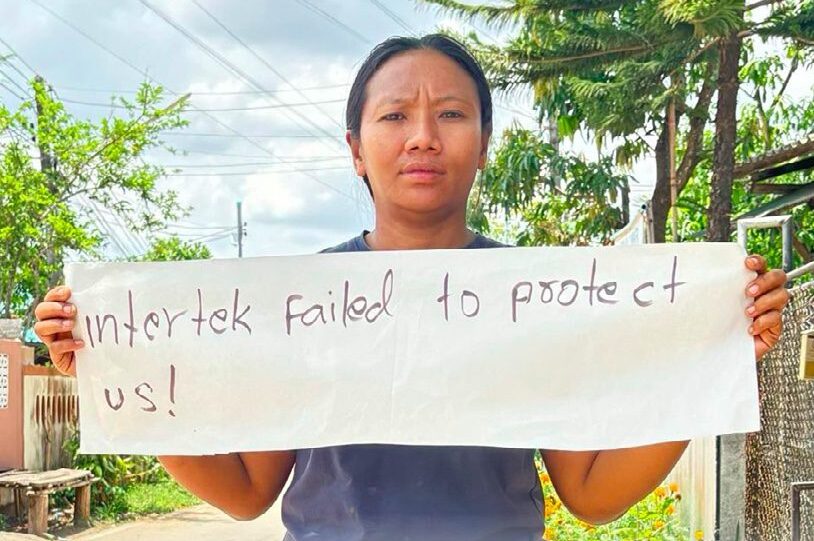
Checking Boxes, Cheating Workers- How Social Audit Firms are Complicit in Labor Rights Abuses
Executive Summary
This report examines three wage and severance theft cases that took place in 2020, early in the COVID-19 pandemic, and the role social auditing firms played in each case. None of these cases have been satisfactorily resolved as of this writing in June 2025. Each remains unresolved at least in part due to ways that the audit firms in question intervened to undermine workers, obfuscate the facts of the case, and shield companies from liability for their human rights obligations.
The cases of the Hulu Garment Factory (Cambodia) and the Hong Seng Knitting and V.K. Garment Factory (both Thailand) all feature common risk factors for human rights abuses. Workers in these garment factories were predominantly women. In the two Thailand cases, the workers were also migrant workers, made vulnerable through their immigration status and legal barriers to unionization. For all of these low-wage workers, language and literacy, gender and pregnancy discrimination, and poverty are all factors that render them vulnerable to exploitation.
Despite these well-recognized risk factors, social audit firms ELEVATE (now LRQA), Impactt Limited, Intertek, and multi-stakeholder initiative Fair Labor Association (FLA) all performed audits or investigations of these factories using methodologies that neglected to address these risks–or in some cases exacerbated them.
Each of these firms market themselves as experts in supporting companies in identifying and addressing human rights risks in their supply chains. Yet the case studies examined here demonstrate inadequate due diligence and poor risk assessment, at the very least. In the worst case scenario, the audit firms appear to act negligently and even to be complicit in covering up abusive practices.
In particular, the Hong Seng and V.K. Garment cases show auditors who are ill-equipped to address factory management’s coercive practices and the consequences of retaliation threats and widespread intimidation. Instead, auditors or inspectors from ELEVATE, Intertek, and the FLA all propose convoluted explanations to selectively discredit worker testimony.
In both the Hong Seng and Hulu cases, ELEVATE, Impactt, and the FLA all take the position that low-wage workers living paycheck to paycheck would in fact freely renounce their pay, despite evidence–and common sense–to the contrary.
The V.K.Garment case is currently being litigated in the UK. This case includes several particularly egregious and unprecedented elements:
• Intertek writing up an audit in three different ways, essentially using the “double-booking” tactics by which a supplier might conceal fraud from auditors to shape the narrative to their client’s advantage.
• Intertek violating workers’ confidentiality and appearing to actively attempt to discredit a worker’s testimony and undermine Checking Boxes, Cheating Workers 7 a judicial process in favor of its client.
• Because this case has gone through both Thai and (currently) UK courts, there is a significant amount of audit documentation available. This unusual transparency means that there is a stark contrast between what is documented by auditors and what appears in workers’ unconstrained testimony to investigative journalists.
In each of the cases examined in this report, an independent investigation had already been completed by the time that any of the audit firms in question were commissioned. This report draws heavily on publicly available investigation reports by the Worker Rights Consortium as their investigations engage local worker organizations, conduct off-site interviews with workers, publish their findings online, and, critically, are not commissioned or paid for by either suppliers or brands.
The UN Guiding Principles on Business and Human Rights establish that businesses have a responsibility to respect human rights and to provide access to remedy when their business practices have caused harm, whether directly or indirectly. Yet despite explicit commitments to these principles, each of the audit firms named in this report currently appears to have done more to delay workers’ access to remedy than to facilitate it. Each of the cases examined in this report reveals how the social auditing industry continues to use discredited methodology, ignores or fails to adequately assess risk, and undermines workers’ testimony. Taken together, the profusion of audits and audit reports points to another finding: These audits assist companies in risk management not through appropriate due diligence but rather through reputation management. Each of the audit firms named in this report currently appears to have done more to delay workers’ access to remedy than to facilitate it.
